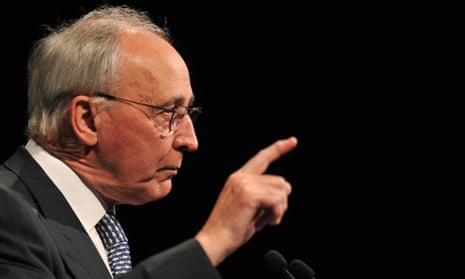The former Australian prime minister Paul Keating has called for a “more independent, balanced foreign policy”, particularly towards China and Indonesia, following the election of Donald Trump as US president.
Keating said Trump had signalled that he was a “big power guy” with little regard for alliances. Australia should take the hint that it was on its own and develop an independent policy rather than regarding the alliance with religious reverence, he said.
Keating made the comments on ABC’s 7.30, a program also featuring his successor John Howard, who said that, despite his concerns about Trump, the strength of the US-Australia alliance and shared values meant it transcended individual leaders.
Howard agreed with the view of the prime minister, Malcolm Turnbull, who said on Thursday that the US would project “enhanced military power” in the Asian region and Trump understood and respected the Australian alliance.
Keating said Australia did not have an independent foreign policy, merely “tag-along rights” with the US that had led to involvement in conflicts like Iraq.
The former Labor leader said that Australia boasted a “better society” than the US, citing greater equality and fairness, growth in incomes, universal healthcare, retirement income system and gun laws.
“We don’t shoot our children in schools, and if they were to be shot we’d take the guns off the people who shot them; the Americans do not do this.”
Australia’s superior society meant it need not subordinate itself to the US, and should develop an independent foreign policy and “make our way in Asia by ourselves”, he said.
Keating said the US alliance had taken on a “sacramental” quality on both sides of politics, accusing Turnbull of “almost saying prayers” to the alliance in his comments after Trump’s election.
Australia should develop an independent policy towards China and focus more on Indonesia and south-east Asia, such as by joining Asean. Keating said Australia was “hounded on by US admirals” to conduct freedom of navigation exercises in the South China Sea, which created problems.
Under Keating’s vision the US alliance would still exist as a treaty that would help Australia get better access to military technology.
The former Labor leader said Australia should dispel “latent fear” that Indonesia or China would attack it, as the former never had and the latter was its largest trading partner.
Keating said it was not a bad thing that Trump was a strongman, and nor were his suggestions of the US reaching accommodations with Russia and China.
Keating noted Trump’s suggestion of a withdrawal from north Asia and demand for allies like Japan and South Korea to “pay for themselves”, including by developing nuclear weapons.
Howard said he “didn’t walk away” from his earlier statements that he trembled at the apparent instability of Trump but he believed his presidency would be “a little less radical and a little less scary than many people have suggested”.
Australia should not “anticipate something that isn’t necessarily going to happen” by going it alone, he said, drawing the distinction between what Trump said in the campaign and how he would govern.
“I … am pretty confident that the historic warmth of the relationship will continue. I don’t believe the new administration is going to walk away from old allies.”
Howard said the Australia-US alliance was “so deeply embedded in history and sentiment it survives changes of personnel both in Canberra and in Washington”.
The former Liberal leader said that Australia couldn’t “hedge its bets” by moving closer to other countries if it wanted the US to continue to be involved in Asia.
US policy experts have said that Trump’s policy towards Asia is largely uncertain because his pronouncements on security policy, particularly towards China, are contradictory.
After speaking to Trump on Thursday, Turnbull said the president-elect would expand the US navy. A recent policy paper written by two of Trump’s campaign advisers asserts: “The US navy is perhaps the greatest source of regional stability in Asia.”
Howard said a lot of Americans voted for Trump because they were upset Barack Obama had contracted US influence, and predicted the US would spend more on defence and strengthen its influence in Asia.
Howard said he didn’t want the US to “turn her back” on free trade and globalisation under a Trump presidency. He said the lesson from the election was “to help the people who are disconnected” and better explain the benefits of those policies.
Howard criticised Hillary Clinton for calling Trump supporters “deplorables” suggesting that “tender loving care” would have served her better with white male workers in rustbelt states.
The former prime minister has previously said comments that Pauline Hanson’s One Nation voters should not be treated as a “scorned species” as it would enhance her appeal.
Even Trump’s “imperfections and indiscretions” represented the change Americans wanted to shake the system up, Howard said, in contrast to Clinton, the quintessential establishment candidate.
